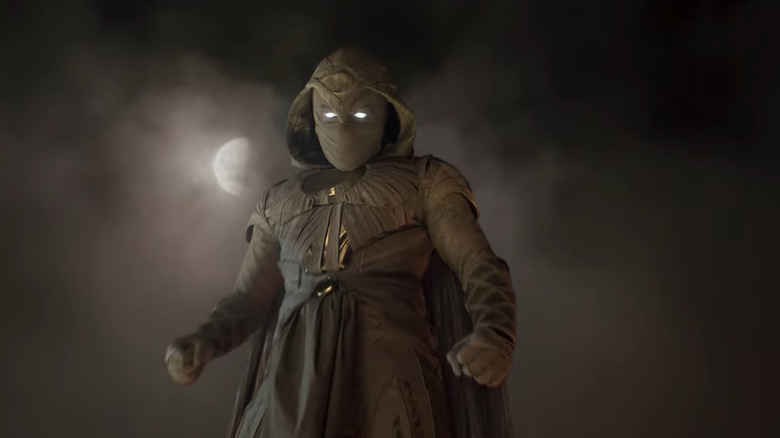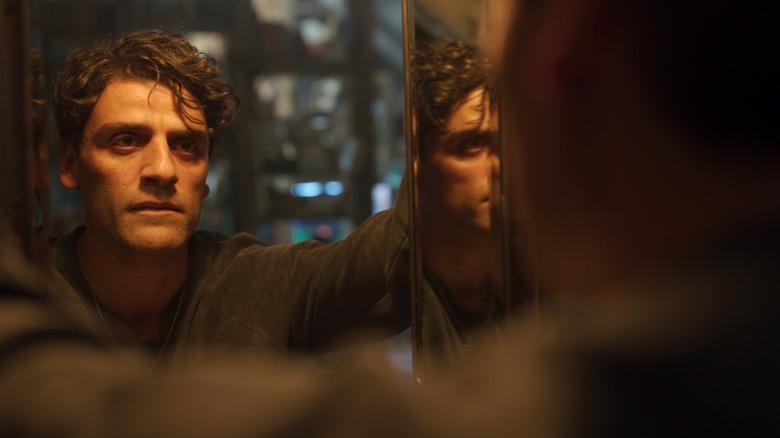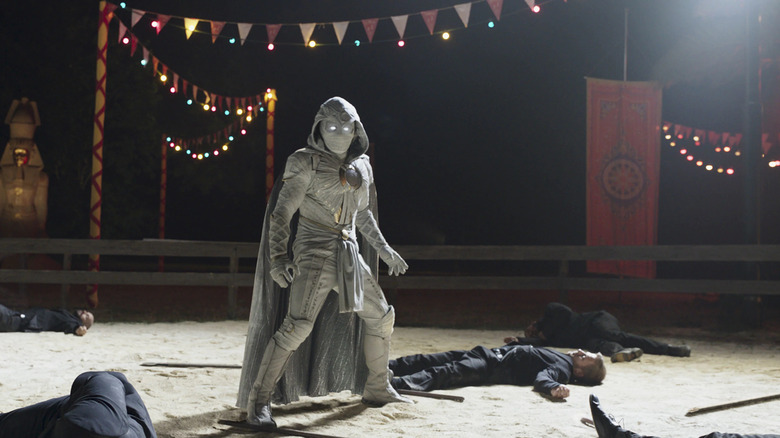Moon Knight Is Not An Origin Story, And Other Superhero Shows Should Take Note
This episode contains minor spoilers for "Moon Knight" episode 2.
"Moon Knight" marks the sixth Marvel Cinematic Universe show on Disney+, and the 33th MCU project (if we don't count the ABC shows), and it's already doing plenty of new and exciting things. For one, the show is giving us Oscar Isaac doing a silly little British accent and acting like a huge dork, for our personal amusement. There's also the exciting action, which is even better when we don't see it.
But one of the things that makes "Moon Knight" stand out the most is that it is a rare superhero show that completely sidesteps an origin story.
A man with a curse
When we first meet the doofus Steven Grant, you'd be forgiven for thinking "Moon Knight" would spend most of its first season building up to the moment where Steven first transforms into the vigilante Moon Knight. But by the end of the first episode, we already see the appearance of Marc Spector and the Moon Knight suit
The second episode, then, is the closest we get to an origin story, with Steven investigating who this Marc guy is, and discovering that he has dissociative identity disorder. But the thing is, what we learn about Marc is not delivered as exposition to the audience. We don't learn the minutiae of Marc's powers or how the suit works. We barely even learn about the god Khonshu.
Instead, what exposition we do get is all emotional. It doesn't matter what Moon Knight's powers are, what matters is that Marc made a deal with the god of the moon, Khonshu, and now serves as his avatar. It doesn't matter how the suit works, it matters that it makes Marc (and later Steven) strong and capable of defending himself. It doesn't matter how Khonshu can exist in the real world and communicate with people, what matters is he's an absolute jerk. It doesn't matter how Marc started working with Khonshu, what does is that he is at the end of his term of servitude, but fears that the next person to take up the mantle is his wife Layla.
Indeed, every explanation we get in this episode is meant not to introduce the audience to Moon Knight the hero, but to Steven's predicament as the guy trapped in the middle of all this. This may be the start of Steven's story, but the final chapter in a story that began a long, long time ago. As Layla tells Steven (who she thinks is Marc), they've already had a lifetime's worth of adventures together, many of which involve the super suit.
Throwing the audience head first into a story with not much explanation and only hints of a much larger conflict is not only different from what we've seen from Marvel in the past, but it could even teach something to most superhero shows in general.
Stop doing overly long origin stories, please!
Every Marvel movie has given us an origin story in one way or another. Even the MCU "Spider-Man" movies, which were praised at first for skipping the origin story, ended up spending an entire trilogy to tell a different kind of origin story where Peter Parker evolves into the Spider-Man we know from the comics — alone and broke. Then there's television, where superhero stories get incredibly longwinded. Take the former Netflix series "Daredevil," which spent the entire first season building up to the moment the hero donned the suit. Then there are worse offenders like "Smallville," which waited until the very last scene of the very last episode before its hero finally stopped being "The Blur" and finally became Superman.
But "Moon Knight" is different. There is no arduous set-up, no waiting around hoping we'll catch a glimpse of a first draft of the awesome costume. Instead, we get the titular hero from the very first episode, and by the second chapter we know everything we need to know.
This show assumes the audience is familiar enough with superheroes to not need explanations on powers and how this world works. Maybe it's because this character is not as well known as, say, Captain America, so we don't need a long build-up to the reveal of the suit. But what we do need is an introduction to Steven, the one variable no one expected, the person that is experiencing everything fresh, and whose emotional journey we do need to understand and connect to. By learning things as Steven does, and by throwing us and him into this story with no warning, we get a superhero show that all other superhero shows could learn from.


